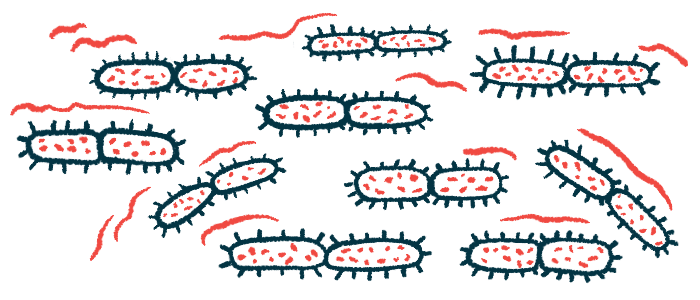First Patient Dosed in Trial of Phage Therapy for Lung Infections
Phase 1b/2 trial is testing investigational bacteriophage therapy WRAIR-PAM-CF1
Written by |

The first patient has been dosed in a Phase 1b/2 clinical trial testing WRAIR-PAM-CF1, an investigational bacteriophage therapy, in adult cystic fibrosis (CF) patients with chronic Pseudomonas aeruginosa lung infections.
The PHAGE trial (NCT05453578) is recruiting an estimated 72 such patients who tested positive for a P. aeruginosa infection in the past year and again at a screening visit. It’s currently enrolling at the University of Minnesota Medical Center, and Case Western Reserve University, in Cleveland, Ohio, with several other U.S. sites expected to open later.
Its goal is to evaluate the potential for bacteriophage therapy as an option for fighting off bacteria that have developed a resistance to antibiotic treatments, specifically P. aeruginosa.
“At Adaptive Phage Therapeutics [APT], we are committed to developing innovative treatments that address the growing problem of antibiotic resistance,” Greg Merril, CEO of APT — the company developing the treatment — said in a company press release. “We are proud to be a part of this important trial.”
A hallmark of CF is the production of thick and sticky mucus that builds up in the body, affecting function of several organs.
In the lungs, this mucus offers a breeding ground for bacteria such as P. aeruginosa, leading to chronic respiratory infections. The most common bacteria type in CF lungs, P. aeruginosa also is highly resistant to multiple types of antibiotics, making it a challenge to treat.
Bacteriophages, or phages, are naturally occurring viruses that target and kill specific types of bacteria. They do so by infecting a bacterium and taking over its reproductive machinery. Instead of creating more bacteria, more bacteriophages are produced, and the bacterium is killed off instead of further colonizing.
Still, phages do not attack human cells or the beneficial bacteria the body needs. That’s why they are regarded as a promising therapeutic candidate for treating bacterial infections that don’t respond to antibiotics.
WRAIR-PAM-CF1 consists of four species of bacteriophages that each naturally infect and kill off P. aeruginosa without targeting human cells. It was developed originally by the Walter Reed Army Institute of Research (WRAIR), which licensed the therapy to APT.
The two-part PHAGE trial, which began enrolling in October, is investigating whether this phage cocktail is safe and can effectively lower the amount of P. aeruginosa in CF lungs, which will be analyzed in the sputum (also known as phlegm).
Researchers also will collect information on how the therapy affects lung function, whether its effects on P. aeruginosa differ by geographical region, and whether the treatment affects quality of life.
Study design
In its Phase 1b part, six participants will receive a single dose of WRAIR-PAM-CF1 directly into the bloodstream at one of three doses and monitored for safety for four days.
If no serious side effects are reported, the Phase 2 portion of the trial will commence, enrolling up to 66 additional participants. Of them, 32 will be assigned randomly to receive a single infusion of WRAIR-PAM-CF1 at one of three doses, or a placebo.
One-month safety and efficacy data will be used to determine the treatment’s optimal dose. The remaining 34 people then will receive that dose or a placebo and be monitored for P. aeruginosa counts and safety.
The trial is led by the Antibacterial Resistance Leadership Group (ARLG), a collection of more than 100 experts collaborating to find solutions to antibiotic resistance. ARLG is funded by the National Institute of Allergy and Infectious Diseases (NIAID).
“We … look forward to working with the ARLG, NIAID, WRAIR, and the CF community to bring new hope to those affected by this devastating disease and secondary respiratory infection,” Merril said.
Other phage therapies for P. aeruginosa lung infections in CF also are in clinical testing, including Armata Pharmaceutcals’ AP-PA02 and BiomX’s BX004.







